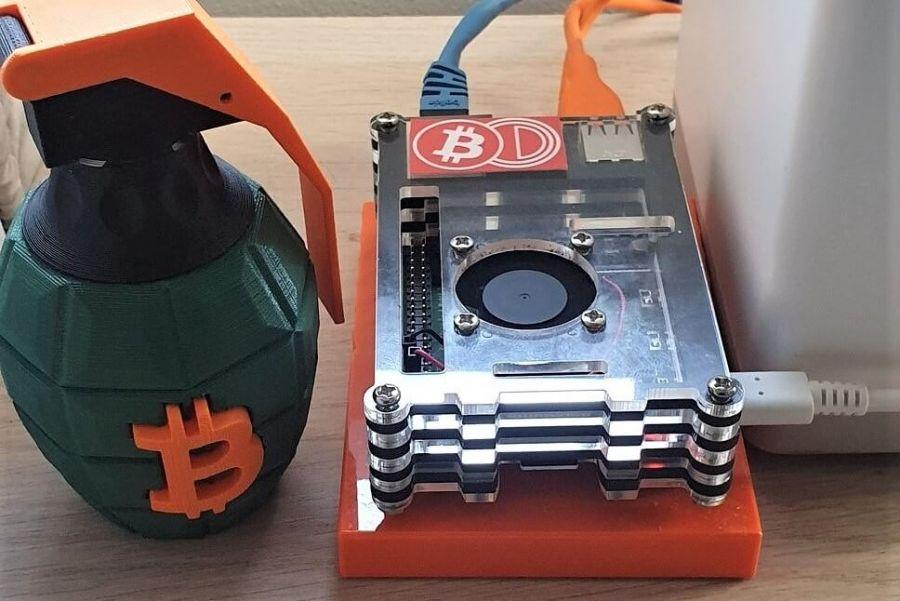Physical Must-Haves in a Digital World: 4 Essentials for Bitcoiners

While the cryptocurrency community is built on a continuing legacy of leveraging software to support decentralized economic systems, hardware still has a place in the crypto universe.
In this article, we will delve into the handful of physical tools bitcoiners can use in the fast-growing, digital-first crypto ecosystem.
Hardware Storage Solutions
Hardware storage solutions are used by essentially all bitcoin (BTC) “HODLers” to securely store any data or information pertaining to the safety of their cryptocurrency holdings. Hardware storage solutions include paper wallets, hardware wallets, and seed phrase backup solutions.
Physical bitcoin wallets that are not connected to the internet, called cold storage or cold wallets, typically come in two forms:
paper wallets,hardware wallets.
Paper Wallets
Paper wallets were one of the earliest wallets used by bitcoiners back when hardware wallets were still in development.
A paper wallet is composed of a piece of paper on which an address and its corresponding private key are printed. The user must keep this piece of paper safe as it allows him access to his digital currency holdings, while keeping it safe from cybertheft as there is no connection to the Internet.
Proponents of the paper wallet believe its relatively low-tech approach, lack of internet connectivity and its portability are its biggest selling points. Critics, however, point out the tool’s fragility. Paper is susceptible to factors like water and age damage, and its much easier to lose a piece of paper than a physical hardware wallet.
Hardware Wallets
Hardware wallets have become the standard for large bitcoin investors. Typically composed of a USB-like device or a smart card on which the private keys of a digital currency address is stored. The private keys are programmatically segregated within the hardware, ensuring they are not connected to the internet to maximize security. Popular hardware wallets include Trezor and Ledger.
Hardware wallets are essential within the digital currency sector because they provide one of the more secure ways to store cryptocurrency. In an industry where malicious actors are becoming increasingly sophisticated, they provide a valuable last line of defence.
Seed Backup Solutions
Seed backup solutions are used to securely store the recovery phrase required to access digital currency wallets. They are typically made of stainless steel or some other long-lasting and durable metal.
Seed backup solution service providers sell kits on which users can engrave their recovery phrase.
Seed backup solutions differ from hardware wallets in that they typically do not have internet connectivity. In this regard, they are similar to paper wallets. However, due to the durability of the metal used, seed backup solutions are becoming increasingly popular. Metal is much less susceptible to the elements than paper, providing a safer private seed storage tool.
Full Nodes
In computer systems, a node is a computer that participates in a network. A full node is one that fulfils all the rules of the network. In the crypto sector, a node is any computing device which joins a digital currency network. This can be a computer, mobile phone, or devices like GPU (graphics processing unit).
There are two types of full nodes within the crypto sector, namely:
a mining node,a read-only full node.
A mining node allows the owner to read and write on the blockchain. It is a combination of blockchain-specific software and hardware which the owner uses to verify the transactions, add them to the blockchain in exchange for new units of the digital currency. A read-only node witnesses and records all transactions but does not secure the network via mining.
Full nodes are essential for any decentralized, open digital currency network to function. It is the synergistic interactions of all full node owners globally that ensure a network remains secure.
Creating a situation where there is no central party to attack while simultaneously providing individuals with the power to guarantee their financial sovereignty, full nodes continue to remain a mainstay in the sector.
Payment Cards
Payment cards are debit or credit cards that allow users to use their digital currency holdings anywhere card payments are accepted. There are a number of service providers – licensed by either Visa or Mastercard – that allow users to spend crypto with ease.
Each service provider differs from the other in terms of features and advantages. Some require users to deposit crypto into their wallets, some are non-custodial, while others offer rewards with cash-back guarantees.
Payment cards are arguably essential for bitcoin users who want to use the digital currency where only fiat currency is accepted. Proponents also argue that interaction between the two financial paradigms is essential to the mainstream adoption of bitcoin.
Blockstream Satellite
In August 2017, blockchain service provider Blockstream revealed it had launched the world’s first public satellite service dedicated to the Bitcoin network.
The Blockstream Satellite allows anyone to connect to, operate and maintain nodes. The satellite increases the general robustness of the Bitcoin network as it protects against events like network partitions or connectivity breakdowns.
Additionally, the free service simultaneously provides areas with low internet connectivity the opportunity to interact with the Bitcoin blockchain, as is in line with the ethos of the open decentralized system envisioned by the Bitcoin creator Satoshi Nakamoto.
The Blockstream Satellite consists of three geosynchronous satellites covering Africa, Europe, South America, and North America, located on specific points in space. Additional centres on Earth, named Teleports, are responsible for uploading and uplinking data to the satellites in space which then distribute it globally. These ground stations are to be added on a continuous pace globally.
Thanks to Blockstream, bitcoiners do not need to launch their own satellites to ensure global Bitcoin network connectivity, making it yet another physical must-have for bitcoiners.
____
Learn more:- 3 Ways To Set Up a Bitcoin Wallet- How to Choose a Bitcoin Wallet?
– How To Make Bitcoin Paper Wallet- How To Store Bitcoin?
– Why It Is Risky To Leave Your Cryptocurrency In Exchange- New Alliance Aims to Replace Crypto Wallet Addresses with “.Wallet” Usernames
– Robinhood Crypto Wallet Waitlist Attracts 1.6M People- El Salvador Bitcoin ‘Scalpers’ Force App Turnaround as Chivo Criticism Continues
– Spain’s Finance Ministry Intensifies Scrutiny of Crypto Wallets, Pay Firms- FTX.US Acquires LedgerX, MetaMask Gets 10M Monthly Users + More News















